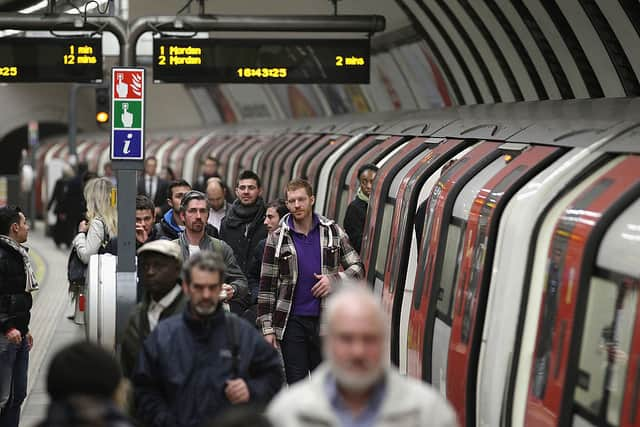TfL day travelcards to be scrapped - cheaper Tube, bus, London Overground ‘pay as you go’ remains
This article contains affiliate links. We may earn a small commission on items purchased through this article, but that does not affect our editorial judgement.
and live on Freeview channel 276
Transport for London (TfL) has been instructed to cease the sale of day travelcards in January.
The mayor of London, Sadiq Khan, has signed an order giving the daily cards - for use on the Tube, buses and London Overground services - just six more months unless funding is found from a third party.
Advertisement
Hide AdAdvertisement
Hide AdLondoners rarely use the paper cards, which are significantly more expensive than ‘pay as you go’ (PAYG) through Oyster or contactless payments.
Day travelcards are most often purchased by visitors as part of a package with a railway ticket.
Under the agreement with rail companies, income from day travelcards is shared and TfL estimates it can bring in £40 million more each year if PAYG is used instead.
Sadiq Khan and TfL’s government funding
A consultation ended last month on the decision, which is part of TfL’s funding agreement with the government.
Advertisement
Hide AdAdvertisement
Hide AdA decision notice signed by mayor of London Sadiq Khan states: “Since May 2020, there has been a series of extraordinary funding settlements with the government to ensure that TfL could deliver an effective and efficient transport service despite the devastating impact of the Covid-19 pandemic on TfL’s income.
“This funding has been provided with a requirement by government for TfL to deliver considerable savings and generate significant amounts of new additional income.
“The government funding settlement dated June 1 2021 required the mayor and TfL to undertake an options review and feasibility study of mechanisms within existing powers to generate between £0.5bn and £1bn of additional net revenue per annum from 2023. Meeting this requirement necessitated TfL developing an option to withdraw from the Travelcard Agreement.”


TfL day travelcards - six months remain
Weekly and annual travel cards will remain available, but the decision means TfL is likely to cease the sale of day travelcards by January 21, 2024.
Advertisement
Hide AdAdvertisement
Hide AdHowever, the door remains open for a new funding deal, with TfL writing on its consultation page: “While this six-month process is now under way, it is important that we are clear this remains reversible and does not therefore mean that day travelcards will be withdrawn. We and the mayor remain open to discussing all options with both the Department for Transport, the Rail Delivery Group and the train operating companies, but in a way which would allow us to continue to meet the requirements of the government funding agreement.”
Disabled rail users’ groups had called for the travelcards to be retained, highlighting the convenience of being able to show station staff a ticket and the ease of buying a ticket with a disabled person’s railcard.
How much is a day travelcard - and how much is pay as you go (PAYG)
To some degree, paper day travelcards are an anachronism anyway - and bad for passengers.
The use of paper cards on National Rail services makes them convenient for some visitors, particularly families, but stations on the rail network are moving towards contactless anyway.
Advertisement
Hide AdAdvertisement
Hide AdFamilies will still have the option of arranging Oyster cards - and Railcards can be used to get cheaper travel on the TfL network.
The cost of daily travel using PAYG - Oyster or contactless payments (tapping a bank card at the gate) - is capped at levels which make it cheaper than using a day travelcard.
The cost of an adult day travelcard for zones 1-6 is £21.50 (anytime) or £15.20 (off-peak), while PAYG travel is capped at £14.90.
Most marked is the price difference in zones 1-2, with visitors paying £15.20 for a day travelcard, or a maximum of £8.10 on PAYG.
Sign up for our newsletter for the latest updates, and follow LondonWorld on Facebook, Twitter, Instagram and TikTok.
Comment Guidelines
National World encourages reader discussion on our stories. User feedback, insights and back-and-forth exchanges add a rich layer of context to reporting. Please review our Community Guidelines before commenting.
